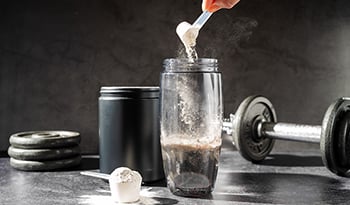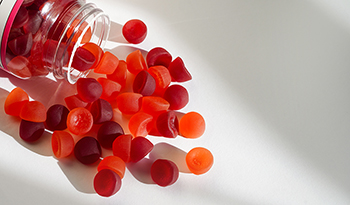3 полезни добавки за начинаещи бегачи

Ако току-що сте започнали да бягате, вероятно сте малко затрупани от всичко, което е свързано с редовното тичане. Рядкото бягане е сравнително лесно и не изисква много мислене. В момента, в който поставим цел пред нашето бягане, обаче, трябва да разработим стратегия за всички дейности.
Трябва да се обърне внимание на програмирането на бягането, на екипировката, която използвате, на начина на хранене и възстановяване и дори на добавките, които приемате. В тази статия ще обсъдим три добавки, които могат да бъдат полезни за начинаещите бегачи.
Защо бегачите може да имат нужда да обмислят добавки
Вместо безразборно да взимате добавки, които обещават големи печалби, е добре да започнете с основни хранителни вещества в началото, а след това да проучите по-целенасочени възможности за добавки, когато напреднете като бегач и целите ви станат по-тесни.
Добавките бяха включени в тази статия, за да подпомогнат два ключови показателя: възстановяване и ефективност. Когато започват, начинаещите трябва да дадат приоритет на усилията за възстановяване, тъй като телата им бързо ще се адаптират и приспособяват към по-високата честота и интензивност на бягане.
Помнете, че подобреното представяне при бягане ще бъде страничен продукт на адекватното възстановяване след продължителни тренировки с интензивно натоварване.
За възстановяване след бягане: Протеинова пудра
Повече от вероятно е някой в живота ви да ви е казвал, че трябва да обмислите употребата на протеин на прах. Нека да сме наясно: няма нищо магическо в протеините на прах, когато става въпрос за подобряване на представянето при бягане, но те са изключително удобен източник на пълноценен протеин и това е много важно да се вземе предвид за представянето и възстановяването.
Пълноценният протеин съдържа достатъчно количество от всички девет незаменими аминокиселини. Тези аминокиселини са необходими за много важни биологични процеси, включително за изграждането на протеини, синтеза на хормони и много други.
Като начинаещ бегач ще изпитвате натрупване на умора, болка и ще се чувствате изтощени от време на време. Това е нормално, тъй като добрата програма за бягане преминава през периоди на натоварване, намаляване на интензивността и след това повтаряне на процеса.
В моментите, когато се чувстваме изморени и изтощени, възстановяването трябва да има по-висок приоритет в ежедневието ни - особено ако искаме да се представим по най-добрия начин в предходните сесии по бягане. Включването на протеини на прах е лесен начин да постигнете целите си за деня и да подпомогнете възстановяването си.
Кога да консумираме протеини за бегачи
По принцип протеинът на прах може да се консумира по всяко време на деня. Ето защо той е основен продукт на толкова много активни хора.
За начинаещите бегачи, особено в контекста на тренировките, може да е полезно да консумират протеин на прах 30 минути до един час преди тренировка или до два часа след нея. Проучванията показват, че и двете могат да бъдат полезни за производителността и възстановяването, а разпределянето на приема на протеини през деня е добра стратегия.
Преди бягане консумацията на протеини може да бъде полезна за енергийните нива и да гарантира, че няма да има срив по средата на бягането поради прекомерен глад. Консумацията на протеини след бягане е полезна за възстановяване и за зареждане на организма с така необходимите незаменими аминокиселини.
Колко протеин трябва да консумират начинаещите бегачи?
За бегачите се смята, че добрата дневна цел за протеини е около 1,2-2,0 g/kg/ден. На разбираем език това означава, че ако един бегач тежи 68 кг и иска да консумира 1,5 г протеин на килограм телесно тегло, той трябва да вземе телесното си тегло и да го умножи по 1,5, което ще се равнява на 102 грама протеин.
Важно е да запомните, че трябва да изберете целево число в този диапазон, което да отговаря на контекста на вашия живот и нужди. Например, ако се опитвате да натрупате мускули или сте в калориен дефицит, тогава число, близко до 2,0 г протеин или малко по-високо, вероятно ще ви бъде от полза.
За възстановяване и ефективност: Електролити
Всеки, който е обмислял да бяга полумаратон или маратон, вероятно е чувал нещо за това, че трябва да се увери, че приема достатъчно електролити.
Електролитите влияят на организма и му носят много ползи, когато става въпрос за подпомагане на резултатите при бягане. Те играят жизненоважна роля за хидратацията, нервната регулация, мускулната функция, балансирането на киселинността на кръвта и налягането, и това са само някои от изброените. Електролитите в човешкото тяло включват натрий, калий, магнезий, фосфат, хлорид, калций и бикарбонат.
По-конкретно електролитите натрий и калий играят важна роля в регулирането на водния баланс на тялото ни по време на тренировка. Когато бягате, обикновено се потите много и губите естествено количество вода, така че консумацията на електролити е безопасен и интелигентен залог за възстановяване на това, което вероятно сме изгубили, за да поддържаме ефективността си.
Кога да консумираме електролити за бегачи
За начинаещите бегачи, които започват да бягат на дълги разстояния, консумацията на електролити по време и след бягане обикновено е добър вариант за попълване на евентуално загубените електролити по време на тренировката.
Важно е да се отбележи, че броят на електролитите по време на тренировъчна сесия може да варира значително, така че не съществува универсално правило за консумация на електролити. Много електролитни добавки са без калории (или с много ниско съдържание) и се смесват с вода доста добре. Обикновено добавянето им към режима за възстановяване и в рамките на тренировката е сигурен залог и се прави лесно.
Колко електролити трябва да консумират начинаещите бегачи?
Както беше споменато по-горе, няма ясни насоки за консумация за всеки бегач, тъй като нуждите на всеки човек са различни. Добре е обаче да започнете от това да се уверите, че покривате препоръчителните си хранителни норми, а след това да ги увеличите в зависимост от дейностите, които сте извършвали, и условията, в които сте ги извършвали.
При по-продължителна активност в горещините може да е целесъобразно да се увеличи приемът на електролити, тъй като тялото вероятно губи повече течности от обикновено.
За възстановяване и ефективност: БЦАА
Аминокиселините с разклонена верига (BCAA) обикновено се препоръчват на всеки активен човек, който се опитва да подобри възстановяването си и евентуално да повиши производителността си.
ВСАА играят жизненоважна роля в снабдяването на организма с ключови аминокиселини, които допринасят за изграждането на протеини, полезни за целите на възстановяването. За бегачите ВСАА могат да бъдат приятно допълнение към увеличаването на дневните нива на аминокиселини по пасивен начин.
Кога да консумирате BCAA за бегачи
Като цяло можете да консумирате ВСАА по всяко време на деня или след тренировка. За бегачите, които се хранят балансирано с достатъчно пълноценни протеини, BCAA могат да имат малка полза за реалния мускулен растеж и възстановяване, тъй като вече получавате достатъчно аминокиселини с храната си.
Въпреки това, ако се притеснявате, че не успявате да покриете дневния си прием на аминокиселини, или ако сте на диета, докато започвате да бягате, добавянето на ВСАА може да бъде умен пасивен ход. Освен това те са нискокалорични и придават вкус на водата!
Колко ВСАА трябва да консумират начинаещите бегачи?
Подобно на електролитите, количеството ВСАА, което може да се консумира за постигане на ползи, варира значително при различните бегачи. Обикновено една порция от нормална добавка BCAA съдържа около 7 г BCAA, което е напълно достатъчно за всеки, който приема достатъчно протеини през деня.
Препратки:
- Vitale, K., & Getzin, A. (2019). Актуализация на храненето и добавките за спортисти за издръжливост: Преглед и препоръки. Nutrients, 11(6), 1289. doi: 10.3390/nu11061289
- Heffernan, S., Horner, K., De Vito, G., & Conway, G. (2019). Ролята на добавките с минерали и микроелементи при тренировки и спортни постижения: Систематичен преглед. Nutrients, 11(3), 696. doi: 10.3390/nu11030696
ОТКАЗ ОТ ОТГОВОРНОСТ:Този УЕЛНЕС ХЪБ няма за цел да поставя диагнози...

















































































 Съдържание
Съдържание
















